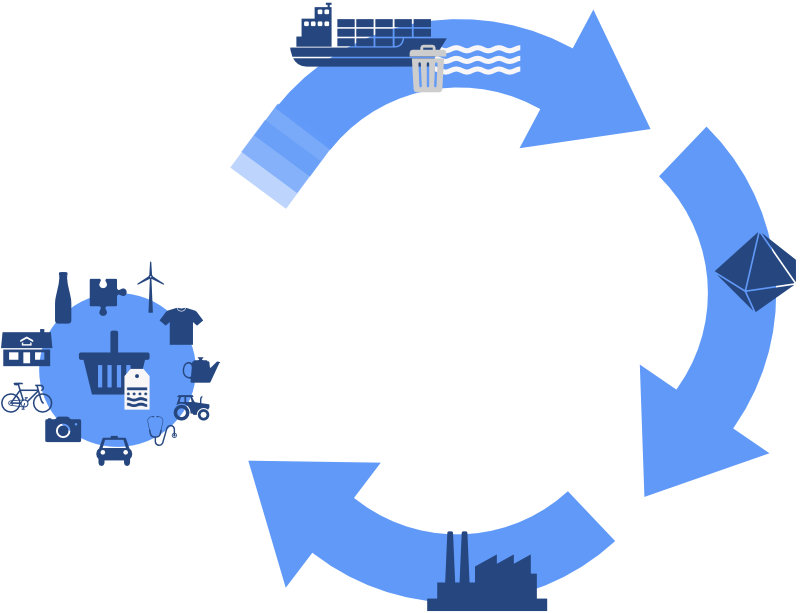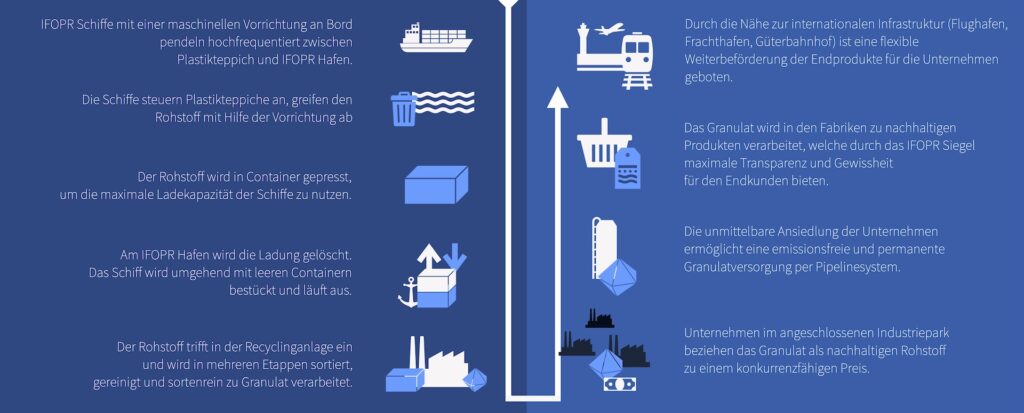We do not question the existence and necessity of plastic.
Plastic is a fundamental material for human life in the 21st century.
We are a consultancy whose primary goal is to work towards the sustainable removal of the vast amounts of plastic waste from the world’s oceans. If necessary, the project will develop into a subsidy model on the part of governments that can be refinanced with plastic taxes. In this way, a plastic tax would be earmarked for a specific purpose. We estimate a timeframe of 10 years for the realisation of our project.

We are convinced that this can only succeed if we sustainably integrate this waste into the economic cycle or expand the existing cycle.

Ships with mechanical devices.
Special devices allow a efficient tapping of the raw material and loss-free compression into containers. In this way, the maximum utilisation of the ships is guaranteed.
For the realisation of these ships, we network companies with institutions that can supply all the components:
Shipping companies: To purchase the ships.
Fraunhofer-Institute: For the technology to evaluate the raw material.
Mechanical Engineering companies: For the on-board press mechanics.
We are currently in the contact and calculation phase with potential partners to find out what the total costs are for a ship with such a facility.
For a problem that concerns us all, we also see the solution as everyone’s responsibility.
From our point of view, this project should be funded by the human family, industry and all stakeholders. For this reason, we are applying for European and international funding. At the same time, we are soliciting support from industry.
The costs for this pilot project can only be precisely quantified after it has been created. Only at that time can we tell and prove to the human family, industry and all stakeholders what the costs will be. A permanent subsidy model for recycling human-made pollution in the world’s oceans is also conceivable.
This mega project can only be realised with support.
We are a non-profit organisation with the legal form of a non-profit limited liability company (gGmbH in Germany).
1 We inform people, institutes, authorities, politicians, governments – simply everyone who has shifted to this topic – about our project.
2 We talk to shipping companies and machine builders to quantify a binding calculation of the costs.
3 We agree on cooperations with already existing organisations in order to use possible synergies.
4 We commission a location analysis to find a location to which the IFOPR offers economic advantages and growth. Discussions are then held with the respective governments on the implementation of the port with industrial park.
5 We manage and accompany the project planning and realisation of the harbour with the connected industrial park. As a contact partner for companies, we arrange the locations within the industrial park.
6
We ensure a successful interaction to extract a sustainable raw material that is considered independent of the price of crude oil. As a pilot project, the realisation simultaneously serves as a blueprint for further, worldwide locations.